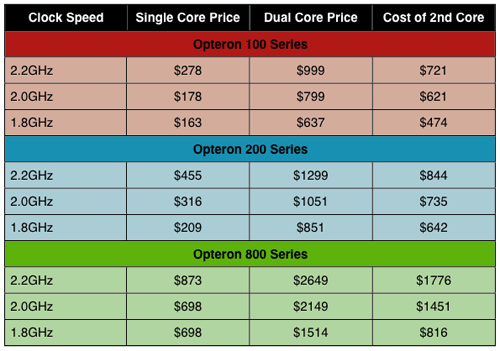AMD's dual core Opteron & Athlon 64 X2 - Server/Desktop Performance Preview
by Anand Lal Shimpi, Jason Clark & Ross Whitehead on April 21, 2005 9:25 AM EST- Posted in
- CPUs
The Lineup - Opteron x75
Prior to the dual core frenzy, multiprocessor servers and workstations were referred to by the number of processors that they had. A two-processor workstation would be called a 2-way workstation, and a four-processor server would be called a 4-way server.Both AMD and Intel sell their server/workstation CPUs not only according to performance characteristics (clock speed, cache size, FSB frequency), but also according to the types of systems for which they were designed. For example, the Opteron 252 and Opteron 852 both run at 2.6GHz, but the 252 is for use in up to 2-way configurations, while the 852 is certified for use in 4- and 8-way configurations. The two chips are identical; it's just that one has been run through additional validation and costs a lot more. As you may remember, the first digit in the Opteron's model number denotes the sorts of configurations for which the CPU is validated. So, the 100 series is uniprocessor only, the 200 series works in up to 2-way configurations and the 800 series is certified for 4+ way configurations.
AMD's dual core server/workstation CPUs will still carry the Opteron brand, but they will feature higher model numbers; and while single core Opterons increased in model numbers by 2 points for each increase in clock speed, dual core Opterons will increase by 5s. With each "processor" being dual core, AMD will start referring to their Opterons by the number of sockets for which they are designed. For example, the Opteron 100 series will be designed for use in 1-socket systems, the Opteron 200 series will be designed for use in up to 2-socket systems and the Opteron 800 series will be designed for use in 4 or more socket systems.
There are three new members of the Opteron family - all dual core CPUs: the Opteron x65, Opteron x70 and Opteron x75.

- The fastest dual core runs at 2.2GHz, two speed grades lower than the fastest single core CPU - not too shabby at all.
- The slowest dual core CPU is priced at the same level as the fastest single core CPU; in this case, $637.
- Unlike Intel, AMD's second core comes at a much higher price. Take a look at the 148 vs. 175. Both run at 2.2GHz, but the dual core chip is over 3.5x the price of the single core CPU.


While AMD will undoubtedly hate the comparison below, it's an interesting one nonetheless. How much are you paying for that second core on these new dual core Opterons? To find out, let's compare prices on a clock for clock basis:











144 Comments
View All Comments
patrick0 - Sunday, April 24, 2005 - link
If they would have the dual-core in stores in June, I would buy one, but this isn't the case, so I'll buy San-Diego 4000+.I'll upgrade when quad-core will be out.
Barneyk - Sunday, April 24, 2005 - link
oh, you cant edit your comments...Anyway, im really excited about this development of computing, not having good multitasking ability feels so outdated, i've been crying about that for years, and fianlly its here...
Well, almost, and its probably another year before i can afford it, but still... :)
Barneyk - Sunday, April 24, 2005 - link
testjvarszegi - Sunday, April 24, 2005 - link
Again, the lack of technical superiority of AT's "experts" is obvious. On SQL Server, you're not supposed to prepend stored-procedure names with "sp_", as it introduces a performance penalty. This is basic knowledge. Some have remarked before on how their .NET "experts" code like, um, transplanted ColdFusion "experts". :)Visual - Sunday, April 24, 2005 - link
a minor error: on page 12 right above the graph it says "The Dual Opteron 252's lead by 19% over the closest Xeon, which was the Quad Xeon 3.6 GHz 667MHz FSB" but the slowest xeon is the 3.3 GHz one.mechBgon - Saturday, April 23, 2005 - link
Zebo... hehe, yep :Djustly - Friday, April 22, 2005 - link
An outstanding article about AMDs duel core, just what I would expect from Anandtech (to bad I had to go to techreport.com to read it).Zebo - Friday, April 22, 2005 - link
Hahaha makes Chetta's drool: Looks just like you MECH.:)MACKTEK - Friday, April 22, 2005 - link
I appreciate the article but am disappointed by the misleading title... AMD's dual core Opteron & Athlon 64 X2 - Server/Desktop Performance Preview. The 939 is not equal to 940. Also, the article clearly saysCOMPARE ATHLON 64 X2... right on the 1st page. In fact the article does not admit to "not having a real x2" until page 13. I love reading anandtech's articles and visit frequently... Perhaps a better title would have been... Preview of Athlon64 X2 using an Opteron CPU.
mechBgon - Friday, April 22, 2005 - link
http://pics.bbzzdd.com/users/mechBgon/drool.jpg#82 says "and corporate PCs could work perfectly and more with a K5-K6/P2-P3."
Ahhh, this again. You obviously haven't worked with a fully-armed installation of McAfee VirusScan Enterprise 8.0i. *evil grin* Hope you enjoyed your stay in 1999... welcome to 2005.
;)